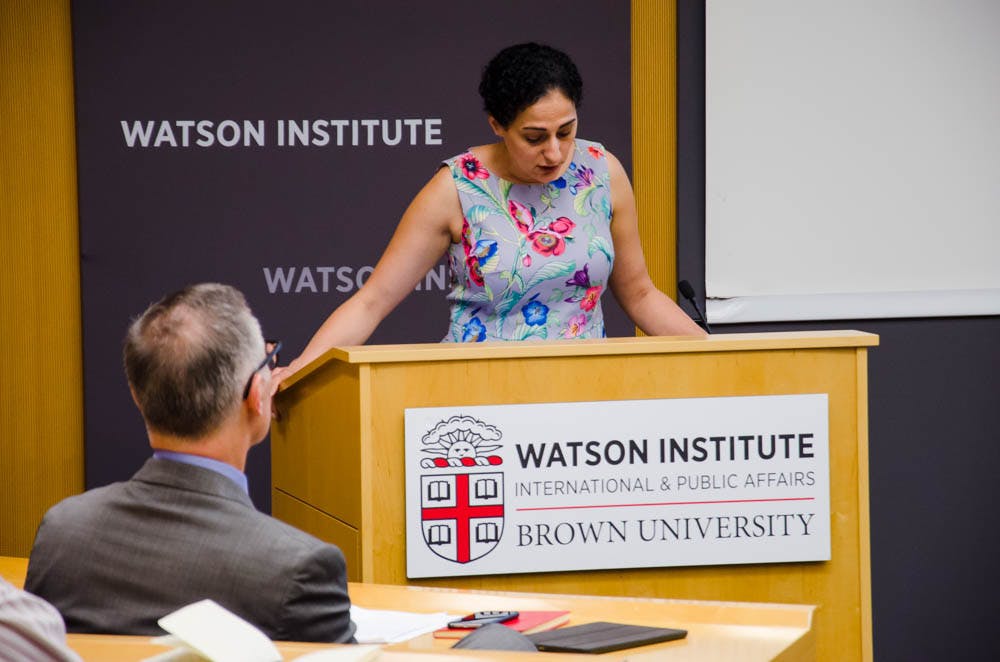“How do we tell the story of Islamophobia, … and how do we tell the story of Trumpism?” asked Nancy Khalek, associate professor of religious studies, as she opened her talk, “Islam, Islamophobia, and Teaching ‘Difficult Subjects’ in the Age of Trumpism” Monday afternoon in the Joukowsky Forum at the Watson Institute for International and Public Affairs.
Islamophobia and Trumpism are anti-intellectual yet politically powerful movements, Khalek said, and both employ similar tactics — binary reasoning and generalizing assumptions — to gain popular traction.
Provost Richard Locke introduced Khalek’s talk as part of the University’s ongoing “Reaffirming University Values” series. The series was initiated before Donald Trump ascended to the Presidency, Locke said, and was intended to discuss topics like free speech. But the Trump administration gave a new meaningto this series given the way his administration’s actions and rhetoric have threatened Brown’s values in unexpected ways, Locke added.
Islamophobia is based on an image of Islam that is “reductive, simplistic and rooted in the clash of civilizations,” Khalek said. Islamophobic logic is based on myths such as the idea that Islam is inherently violent and fundamentally different from Christianity or Judaism and that Muslims are intent on subjugating non-Muslim populations, she said. The idea that radical Islam is the single greatest threat to U.S. safety is also a myth, she added.
Many of these myths have been actively cultivated by members of Trump’s inner circle, said Khalek. For example, though only 0.0066 percent of the world’s Muslims are inclined toward religious-based violence, Brigitte Gabriel, a conservative journalist with a close relationship to the Trump administration, has said the number is 15-20 percent. This numerical disparity speaks to a desire in the “Islamophobia industry” to exaggerate the threat radical Islam poses to the United States, Khalek said. In one year, there were five deaths by jihadist attack in the U.S. compared to 406 deaths by drowning in a bathtub, Khalek said.
Trumpism profits from Islamophobia and exacerbates it, Khalek said, explaining that Trump’s anti-Islamic rhetoric is not so much based on a real fear of terrorism or violence, but rather on an aversion to racial diversity. She cited “The Flight 93 Election,” a blog post that garnered attention during Trump’s campaign, written by Trump advisor Michael Anton under the pen name Publius Decius Mus, as evidence of Trumpism using Islamophobia as a tool. In the piece, Anton wrote that Muslim immigration inevitably hurts the United States and argued that the United States is not a nation of immigrants but a nation of settlers that later chose to admit immigrants — and can stop at any time.
U.S. media is also responsible for cultivating American’s conviction that terrorism is uniquely Islamic and Western-oriented, Khalek said. She displayed a list of every terrorist attack that had occurred in the past year. The vast majority had occurred in the Middle East and did not receive headline news coverage from major U.S. media outlets — those that had were attacks against Western cities.
Given this political context, the challenge for a professor is teaching difficult and politically fraught topics, Khalek said. When she has discussed the Islamic State of Iraq and Syria in her classes, she has had students of Iraqi descent and students with family in the U.S. military in the same classroom, she said.
“While some students may find the airing of controversial issues unsettling, … I’m not in a position” to avoid controversial topics, Khalek said. Instead, she said her mission as a professor is twofold: “How do I allow students to voice contentious, ugly or even ignorant views, so that they can learn without fear of recrimination? And how do I foster respect and care for students who may be adversely affected by that process?”
In the question and answer period, Assistant Professor of Religious Studies Andre Willis asked why Khalek chose to situate anti-Muslim sentiment as a phobia, “instead of as anti-Islamic activism” or racism.
“It’s kind of a terminological thing. Some people prefer not to use the term (Islamophobia)” and instead use terms like anti-Islamic racism, which is U.S.-specific given this country’s history of racism, Khalek said. “Phobia” can make sense, because a big part of anti-Islamic racism is based in fear, she added.
Another audience member asked whether Trump’s populism should be contextualized as a uniquely American phenomenon or if it should be looked at through an international lens. Khalek said that the “genealogical ancestor” of Trumpism is colonialism, which is an international issue, but that we should not bunch populist movements together as having more in common than they actually do. French populism and Turkish populism are distinct due to their different roots, she said, adding “there seems to be a lot of populism around, but that might just be because empires breed populism.”





